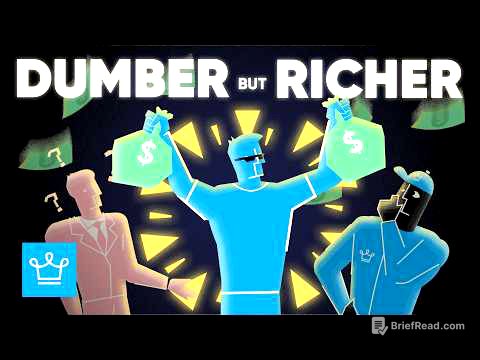TLDR;
This YouTube video by CA Akshansh Garg provides a detailed explanation of GST (Goods and Services Tax) in India, focusing on its applicability, the concept of supply, and the definitions of goods, services, and consideration. The video aims to clarify the foundational aspects of GST for students and professionals, emphasizing the importance of understanding these basics for more advanced topics.
- GST is a dual-based tax controlled by both the central and state governments.
- The GST Council makes decisions on GST rates and implementation.
- Key concepts include the definitions of goods, services, and consideration, which are essential for determining GST applicability.
- The video also covers actionable claims, the treatment of alcohol and petroleum products under GST, and the importance of consistency and discipline in studying.
Introduction [0:26]
The session begins with a welcome and a reminder about the importance of consistency and discipline in studying. It's noted that consistent engagement with classes and materials is more effective than sporadic efforts.
GST Basics and Historical Context [2:37]
The discussion covers the problems that existed before GST, such as double taxation and tax on tax. GST was introduced on July 1, 2017, and is applicable throughout India, including Jammu and Kashmir. The video also touches on the differences between fast track and regular courses for IDT (Indirect Tax).
Dual GST Model and GST Council [4:56]
GST in India operates on a dual basis, with control shared between the central and state governments. The GST Council, comprising representatives from both central and state governments, makes decisions related to GST rates and implementation.
GST Compensation and Acts [6:22]
The government introduced GST compensation cess to insure states against revenue loss. The CGST (Central Goods and Services Tax) Act, SGST (State Goods and Services Tax) Act, UTGST (Union Territory Goods and Services Tax) Act, and IGST (Integrated Goods and Services Tax) Act are discussed.
Intra-state vs. Inter-state Transactions [9:16]
In intra-state transactions (within the same state), CGST and SGST are levied, with the revenue split between the central and state governments. In inter-state transactions, IGST is applicable, and the central government collects the tax, later distributing the state's share to the destination state.
UTGST and IGST Concepts [18:29]
For transactions within a Union Territory, CGST and UTGST are levied. If a transaction occurs between two states or between a state and a Union Territory, IGST is applicable. The concept of IGST was introduced to avoid the need for businesses to register in every state where they have customers.
Taxes Merged into GST [22:46]
Various central and state taxes have been merged into GST, including service tax, excise duty, luxury tax, entertainment tax, tax on advertisement, and entry tax.
Exclusions and Special Cases [24:15]
Alcohol is permanently excluded from GST, while petroleum products may be included in the future based on GST Council recommendations. Tobacco is subject to both GST and excise duty. Opium and other narcotic drugs are also subject to both GST and state excise duty.
Introduction to Supply [27:16]
The chapter on supply is introduced as the foundation for understanding GST. GST is applicable only if a supply is made. The definitions of goods and services are crucial for determining whether GST applies.
Definition of Goods [30:58]
Goods are defined as every kind of movable property other than money and securities. However, the definition includes actionable claims, growing crops, grass, and things attached to or forming part of the land that are agreed to be severed before supply.
Definition of Service [45:39]
Service is defined as anything other than goods, money, and securities. Activities relating to the use of money or its conversion from one form to another, for which a separate consideration is charged, are considered services.
Definition of Consideration [49:35]
Consideration means something in return for a supply. It does not necessarily have to be in money; it can be in another form, provided it has monetary value. Inducement and four forbearance are also included in the definition of consideration. Subsidies provided by the central or state government are not counted as part of the consideration.
Circular on Donations and Gifts [1:17:01]
The video references a circular regarding donations received by charitable institutions. For GST not to be levied on donations, three conditions must be met: the gift or donation must be to a charitable organization, the nature of the payment must be a gift or donation, and the purpose must be philanthropic, with no advertising intent.
Section 7 and Forms of Supply [1:40:21]
Section 7 of the CGST Act defines supply. It includes 71A, 71B, and 71C (Schedule One). Section 71A outlines four conditions for a transaction to be considered a supply: it must involve goods or services, it must be made or agreed to be made, it must be for consideration, and it must be in the course or furtherance of business. All forms of supply include sale, transfer, barter, exchange, license, rental, lease, and disposal.









